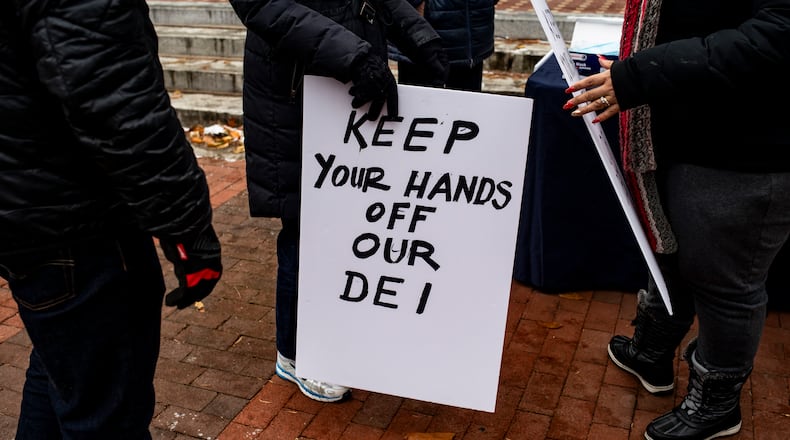Language is more than expression. It’s access. It’s visibility. It’s a strategy. And in the world of federal funding and public service, it’s everything.
For the past 16 years, I’ve led Fathers Inc. through the complex world of federally funded programming. We’ve secured and managed over $90 million in federal contracts and grants, not because we were lucky, privileged or “didn’t deserve it,” but because we were highly successful in doing the work and learned to tell our story in ways that met the moment: truthfully, tactfully and strategically. But this moment is different.
Under the current presidential administration, a growing list of words has been deemed off-limits in federal communications, applications and narratives. Words like “equity,” “inclusion,” “marginalized” and “trauma.” Words like “systemic,” “bias,” “gender” and “justice.” Words that, for many of us, are not just labels, but anchors for the very work we’re doing.
These restrictions are not subtle. They are deliberate. And they are forcing every organization working in the public sector to ask the same question: How do we tell the truth if we can’t say the words that define it?
Let’s be clear: This isn’t an article to debate political narratives of who’s right and who’s wrong. It’s not a judgment on how some may feel about the changes in process and policy. It’s an acknowledgment that, as service providers, we must find ways to coexist in this current climate in order to continue doing great work — even if the method isn’t what we’re used to.
This isn’t about political correctness. It’s about precision. When I say we work with Black fathers, I’m not being divisive. I’m being accurate. When we say our work addresses generational trauma, it’s not a theory — it’s a pattern we’ve seen play out across families, ZIP codes and courtrooms. Removing these words doesn’t remove the need. It removes clarity.
Federal funding applications now require us to describe systemic issues in neutral terms, but neutrality isn’t always honesty. And in trying to remain neutral, we risk becoming vague, detached and ineffective.
When we can’t use the language of lived experience, we start telling sanitized stories. We say “underserved” instead of naming who has been consistently excluded. We describe “barriers” without naming what’s creating them. We talk about “stress” instead of trauma and “instability” instead of injustice.
The people we serve are not confused about what they’re facing. They know what it is, and they need us to name it, not soften it. Our narratives are our north star. They guide how we serve, how we evaluate, and how we grow. If our narratives are compromised, our programs will be, too.
Here’s the twist. Federal agencies may prohibit certain words, but they still want the same outcomes: decreased disparities in education, health and housing; increased access to services in historically excluded communities; programs that are responsive, measurable and relevant to real-world challenges. They want the work; they just don’t want the words that define it.
So we’re left with a choice. Do we mute our message? Or do we find a new way to speak?
At Fathers Inc., we’re not giving up the language of our mission, but we are learning how to frame it differently. Instead of “trauma-informed,” we say “responsive to stress, instability and harm.” Instead of “marginalized youth,” we say “young people with limited access to consistent services or support.” Instead of “racial disparities,” we say “gaps in outcomes that align with community background and geography.”
It’s not perfect, but it’s precise. And it keeps the door open.
If we can’t say “equity,” we can still show it through data. If we can’t say “justice,” we can describe accountability. If we can’t name the identities of the people we serve, we can highlight the patterns that shape their outcomes.
Storytelling is still our superpower. We just need new methods. We’ll use numbers to ground narratives, describe the condition instead of labeling the identity, and focus on how systems function, not just how they’re named.
We are not just program leaders. We are translators. We have to translate pain into policy, exclusion into access and community need into compliance language that gets funded. That takes more than wordsmithing. It takes discipline, wisdom and courage.
This language shift is not the end of the work. It’s a test of how well we understand it. The people most affected by injustice, poverty and instability do not benefit from our frustration. They benefit from our ability to adapt and continue serving.
No, we will not stop telling the truth. We will tell it more clearly, strategically and intentionally, because the work is still urgent, the need is still there, and the story still matters.
A 2023 report by the Urban Institute noted that language shifts in federal guidance have created “significant tension” for community-based organizations that rely on accurate language to demonstrate community need and program effectiveness. Similarly, a survey by the National Network of Public Health Institutes found that 63% of practitioners felt limited in their ability to describe health disparities due to shifting political language restrictions.
In the face of this, we do not retreat. We adapt.
As I often say, “Our job isn’t just to get funded. Our job is to stay faithful to the communities we serve even when the language gets rewritten.”
The truth still lives in the work. It’s our job to make sure it also lives in the words.
Credit: Handout
Credit: Handout
Kenneth Braswell, chief executive officer of Fathers Inc., leads efforts to promote responsible fatherhood and strengthen families nationwide. With extensive experience in community development and father engagement, he drives impactful initiatives and policies. Learn more at www.fathersincorporated.com.
About the Author
Keep Reading
The Latest
Featured


